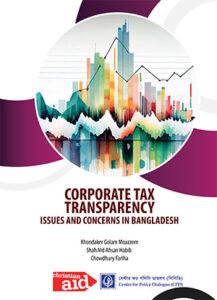 Corporate taxation’s transparency concerns have drawn regulatory bodies’ and policymakers’ attention. Global corporate income tax remains a key revenue source, shaping economic behaviour and resource distribution. However, profit-shifting practices have led to tax evasion, avoidance, and money laundering, impacting government revenues and development goals. Developing countries like Bangladesh face severe socio-economic consequences from these practices. In Bangladesh, the magnitude of tax loss reaches a staggering BDT 842 billion, representing a substantial 30.2 per cent of the total economy. Tax evasion is responsible for a tax loss ranging from BDT 418 billion (15 per cent estimate) to a staggering BDT 2,230 billion (80 per cent estimate). Tax avoidance, on the contrary, results in a loss ranging from BDT 140 billion (5 per cent estimate) to BDT 695 billion (25 per cent estimate). The tax loss is 2.6 times the health sector expenditure and equals 100 per cent of the education and technology budget. It surpasses social safety and welfare expenditure by 300 per cent and accounts for over 60 per cent of the total budgeted expenditure of BDT 1,395 billion in 2021 across vital sectors like health, education, technology, social safety, and welfare. This study highlights the need for tax transparency and offers recommendations for widening the tax net, rationalizing exemptions, promoting digital transactions, addressing corruption, and adopting successful models. Mandatory sustainability reporting is proposed for increased transparency. Prioritizing tax transparency can propel countries toward equitable growth and well-being through effective fiscal management and targeted social spending.
Corporate taxation’s transparency concerns have drawn regulatory bodies’ and policymakers’ attention. Global corporate income tax remains a key revenue source, shaping economic behaviour and resource distribution. However, profit-shifting practices have led to tax evasion, avoidance, and money laundering, impacting government revenues and development goals. Developing countries like Bangladesh face severe socio-economic consequences from these practices. In Bangladesh, the magnitude of tax loss reaches a staggering BDT 842 billion, representing a substantial 30.2 per cent of the total economy. Tax evasion is responsible for a tax loss ranging from BDT 418 billion (15 per cent estimate) to a staggering BDT 2,230 billion (80 per cent estimate). Tax avoidance, on the contrary, results in a loss ranging from BDT 140 billion (5 per cent estimate) to BDT 695 billion (25 per cent estimate). The tax loss is 2.6 times the health sector expenditure and equals 100 per cent of the education and technology budget. It surpasses social safety and welfare expenditure by 300 per cent and accounts for over 60 per cent of the total budgeted expenditure of BDT 1,395 billion in 2021 across vital sectors like health, education, technology, social safety, and welfare. This study highlights the need for tax transparency and offers recommendations for widening the tax net, rationalizing exemptions, promoting digital transactions, addressing corruption, and adopting successful models. Mandatory sustainability reporting is proposed for increased transparency. Prioritizing tax transparency can propel countries toward equitable growth and well-being through effective fiscal management and targeted social spending.
Authors: Khondaker Golam Moazzem, Shah Md Ahsan Habib and Chowdhury Fariha
Publication Period: August 2023

